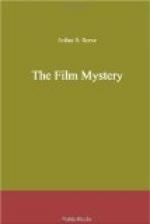“Was anyone, any of those on our list of possible suspects at least, alone in the room—or in the house?”
“Not while I was there,” Mackay replied. “I took good care of that. Then, when everyone was gone and while Phelps was waiting for me, I detailed two of my deputies to stay on guard—one inside and one outside—for the night. I thought it sufficient precaution, since you had made your preliminary examination.”
“And—” Kennedy nodded, seeking to hurry the explanation.
“And yet,” added Mackay, “some one entered the house last night in spite of us.”
Kennedy fairly swore under his breath. He seemed to blame himself for some omission in his investigation the previous afternoon.
“How did it happen?” I asked, rather excitedly.
“It was about three o’clock, the guards tell me. The man inside was dozing in a chair before the living-room fireplace. He was placed so he could command a view of the doorway to the library as well as the stairs and reception hall. All at once he was awakened by a shot and a cry from outside. He jumped up and ran toward the library. As he did so the portieres bellied in toward him, as if in stiff sudden draught, or as if some one had darted into their folds quickly, then out. With no hesitation he drew his own weapon, rushing the curtains. There was no one secreted about them. Then, with the revolver in one hand, he switched on the lights. The room was empty. But one pair of French windows at the farther end were wide open and it was that which had caused the current of air. He ran over and found the lock had been forced. It was not even an artistic job of jimmying.”
“What about the deputy posted outside?” prompted Kennedy.
“That’s the strange part of it. He was alert enough, but it’s a big house to watch. He swears that the first thing he knew of any trouble was the sharp metallic click which he realized later was the sound made by the intruder in forcing the catch of the French window. It was pretty loud out in the quiet of a Tarrytown night.
“He started around from the rear and then the next thing he caught was the outline of a shadowy slinking figure as a man dropped out of the library. He called. The intruder broke into a run, darting across the open space of lawn and crashing through the shrubbery without any further effort at concealment. My man called again and began to chase the stranger, finally firing and missing. In the shrubbery a sharp branch whipped him under the chin just as he obtained a clear view of the outlined figure of his quarry and as he raised his weapon to shoot again. The revolver was knocked from his hand and he was thrown back, falling to the ground and momentarily stunned. Whoever broke into the library got away, of course.”
“What did the intruder look like?” There was an eagerness in Kennedy’s manner. I grasped that the case was beginning to clarify itself in his mind.




